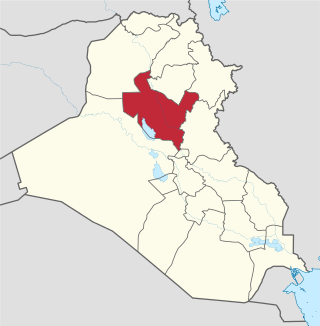Saladin Governorate
| Saladin Governorate صلاح الدين Salah ad Din Province | |
|---|---|
| Governorate | |
 | |
| Coordinates: 34°27′N 43°35′E / 34.450°N 43.583°ECoordinates: 34°27′N 43°35′E / 34.450°N 43.583°E | |
| Country |
|
| Capital | Tikrit |
| Governor | Raed al-Jabouri |
| Area | |
| • Total | 24,751 km2 (9,556 sq mi) |
| Population (2011 [1]) | |
| • Total | 1,408,200 |
| Official language(s) | Arabic |
The Saladin or Salah ad Din Governorate (Arabic: صلاح الدين, Ṣalāḥ ad-Dīn) is a governorate in Iraq, north of Baghdad. The governorate has an area of 24,363 square kilometres (9,407 sq mi). The estimated population in 2003 was 1,042,200 people. The capital is Tikrit; the governorate also contains the significantly larger city of Samarra. Before 1976 the governorate was part of Baghdad Governorate.
The province is named after Saladin (written Salah ad-Din in modern Arabic Latin transcription), a Muslim leader who defeated the Crusaders at Hattin, and who hailed from the province. Salah ad Din was the home province of Saddam Hussein; he was born in Al-Awja, a town near Tikrit.
Overview

Saladin Governorate contains− a number of important religious and cultural sites. Samarra, the governorate's largest city, is home to both the Al-Askari Shrine (an important religious site in Shia Islam where the 10th and 11th Shia Imams are buried), the Sardab, where the 12th Imam al-Mahdi went into occultation, and the Great Mosque of Samarra with its distinctive Malwiya minaret. Samarra was also the capital of the Abbasid Caliphate in the 9th century CE, and today Abbasid Samarra is a UNESCO World Heritage Site. The ancient Neo-Assyrian Empire Assyrian city of Assur is located in Al-Shirqat District on the banks of the Tigris River. Other sites in the governorate include the Crusader Dome (القبة الصلبية) north of Samarra and the Al-`Ashaq Palace (قصر العاشق).
In January 2014, there were plans to make Tuz Khurmatu, a district of Saladin Governorate, into a new governorate.[2] However, these plans were announced by Prime Minister Nouri al-Maliki and were not followed up by his successor, Haider al-Abadi, who replaced Maliki in August 2014.[3]
Autonomy
In October 2011, the government in Saladin governorate declared itself a semi-autonomous region within Iraq. The government explained that the declaration was in response to the central government's "domination over the provincial council authorities".[4] Saladin, which is a largely Sunni governorate, is also hoping that by declaring themselves an autonomous region within Iraq, it will entail them to a larger portion of government funding.[4] The council cited "article 119 of Iraq's constitution" in its call for autonomy, which states that "one or more governorates [provinces] shall have the right to organize into a region" if one third of the Provincial Council members or one tenth of the voters request to form a region".[5]
Provincial government
- Governor: Raed al-Jabouri[6]
- Deputy Governor: Ammar Hikmat[7]
- Provincial Council Chairman: Ahmed Abdel-Jabbar al-Karim[6]
Districts

- Al-Daur District (Al-Daur)
- Al-Shirqat District (Al-Shirqat)
- Baiji District (Baiji)
- Balad District (Balad)
- Samarra District (Samarra)
- Tikrit District (Tikrit)
- Tooz District (Tooz)
- Dujail District (Dujail)
Towns and cities
- Tikrit
- Baiji
- Balad
- Samarra
- Dujail
- Al-Dour
- Yathrib
- Al-Shirqat
- Sulaiman Bek
- Yankjah
- Touz
- Al Ishaqi
- Amirli
- Al Seniyah
- Al Dhuluiya
- Sa'ad (Iraq)
- Al-Faris(Bamerni)
- Al-Hajaj
Population
The following table shows the populations of the districts of Saladin Governorate, according to the United Nations in 2003. No data is available for Dujail District.
| District | Samarra | Tikrit | Balad | Baiji | Al-Shirqat | Al-Daur | Tooz | Total |
|---|---|---|---|---|---|---|---|---|
| Population | 348,700 | 180,300 | 107,600 | 134,000 | 121,500 | 46,700 | 103,400 | 1,042,200 |
See also
| Wikimedia Commons has media related to Saladin Governorate. |
References
- ↑ Citypopulation.de
- ↑ "Iraqi Council of Ministers approved new provinces of Tuz Khurmatu and Tal Afar". Kurd Net. 21 January 2014. Retrieved 23 August 2014.
- ↑ See for example the following newspaper article from July 2015, which refers to Tuz Khurmatu as part of Saldin Governorate. "محتجون يتظاهرون في طوزخورماتو ضد القصف التركي" [Protestors demonstrate in Tuz Khurmatu]. شفق نيوز (in Arabic). Retrieved 2015-07-30.
- 1 2 Hammoudi, Laith. "Saddam's home province declares regional autonomy in Iraq". McClatchy Newspapers. Retrieved 14 December 2011.
- ↑ "Baghdad tries to cancel demands of Diyala Province". Kurdsat TV. Retrieved 15 December 2011.
- 1 2 "Iraq: Saladin governor protests Shia militia's looting". Middle East Monitor - The Latest from the Middle East. 4 April 2015. Retrieved 28 July 2015.
- ↑ "Fierce clashes rage around IS-held Iraqi city of Tikrit - BBC News". BBC News. Retrieved 2015-07-28.
External links
- Official Website (in Arabic)
- Article and vidéo on civilians massacre on BBC News.
- "3 U.S. soldiers charged with killing of Iraqis" on CNN.
